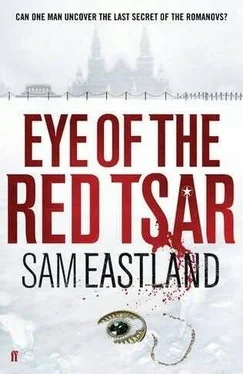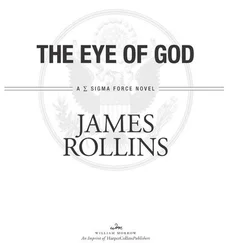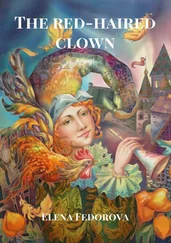“It will be over soon, Excellency,” said Pekkala. “By tomorrow, the terrorists will have been arrested.”
“This is about more than just one group of terrorists,” replied the Tsar. “It’s the war which has brought us to this. I think back to the day it was declared, when I stood on the veranda of the Winter Palace, looking out across that sea of people who had come to show their support. I felt that we were indestructible. The notion of surrender had not even crossed my mind. I could never have imagined the defeats we would suffer. Tannenburg. The Masurian Lakes. The names of those places still echo in my mind. I should have listened to Rasputin.”
“What has this to do with him?” Pekkala had met the Siberian mystic, who supposedly possessed the magical ability to cure the hemophilia that afflicted the Tsar’s only son, Alexei. In Pekkala’s judgment, Rasputin was a man who understood his limitations. It was the Tsar, and even more so the Tsarina, who had demanded from Rasputin a wisdom he did not possess. He had been called upon to judge matters of state about which he had little knowledge. The best he could do, most of the time, was to offer vague words of comfort. But the Romanovs had fastened on those words, stripping them of vagueness, turning them to prophecy. It was no wonder Rasputin had become so hated by those who sought the favor of the Tsar.
Pekkala had been there, on a bitterly cold morning in December of 1916, when the Petrograd police fished Rasputin’s body from the Neva River. Rasputin had been invited to a private party at the house of Prince Yusupov. There he was fed cakes which, with the help of a doctor named Lazoviert, had been laced with enough potassium cyanide to have killed an elephant. When the poison appeared to have no effect, Yusupov’s accomplice, a government minister named Purishkyevich, shot Rasputin several times and stabbed him in the throat. Then they both rolled him in a heavy carpet and dumped him in the water where, in spite of everything which had been done to him, Rasputin died by drowning.
“Grief without end,” said the Tsar. “That is what Rasputin said the war would bring us. And look how right he was.”
“All wars bring grief, Excellency.”
The Tsar turned to him, trembling. “God spoke through that man, Pekkala! Who speaks through you, I’d like to know.”
“You do, Excellency.”
For a moment, the Tsar looked stunned. “Forgive me, Pekkala,” he said. “I did not have the right to speak to you that way.”
“Nothing to forgive,” replied Pekkala. It was the only lie he ever told the Tsar.
KIROV ’S VOICE SNAPPED PEKKALA BACK TO THE PRESENT.
“What about Grodek?” asked Kirov. “What became of him?”
“When Okhrana agents surrounded the safe house, a gunfight broke out. The Okhrana found themselves under fire from weapons they themselves had supplied to Grodek. After the battle, of the thirty-six members of the terrorist cell, the Okhrana found only four survivors among the dead. Grodek was not one of them, and neither was Maria Balka. The two of them had simply disappeared. That was when the Tsar sent for me, with orders to arrest Balka and Grodek before they had the chance to kill again.” He let out a long sigh. “And I failed.”
“But you did find him!”
“Not before he had killed again. I tracked them down to a small lodging house on Maximilian Lane in the Kasan district of Petersburg. The owner of the house had remarked on the difference in age between the woman and the man. He assumed they were simply having an affair, a thing proprietors of places like that are sometimes obliged to overlook. But they kept bringing boxes into their room, and when the owner asked what was in them, Balka told him it was only books. Now people who are having an affair do not spend their days shut away and reading books. That was when the landlord notified the police. Soon we had the house surrounded. I waited at the back of the house. Okhrana agents went in the front, expecting that Balka and Grodek would try to leave through the rear, where I would apprehend them.
“Unfortunately, having been trained in police work, Grodek noticed the agents moving into place. When the agents kicked down the door to the room, they set off a bomb which tore away the whole front of the building. Grodek had made it, killing the same people who had trained him in the art of bomb making. We lost four agents and sixteen civilians in the blast. I myself was knocked almost unconscious. By the time I got up, Balka and Grodek were running out of the back of the building.
“I chased them along Moika Street, by the banks of the Neva. It was the middle of winter. The streets were ankle deep in slush, and snow had piled up on the sides of the road. I could not get a clear shot at them. Eventually, Balka slipped. She must have broken her ankle. I caught up with them on the Potsuleyev Bridge. Police were coming from the other way. There was no cover. I had them in my sights. They had no place to go.” Pekkala paused. He closed his eyes and pinched the bridge of his nose. “And what I saw next, I have never been able to get out of my head. They stopped at the crest of the bridge. I could hear the police shouting at them from the other side. Balka was obviously hurt. Grodek had been alternately carrying her and dragging her for several blocks, and he had become exhausted. It was clear that they couldn’t go on. I called to them. I said it was time to give up. Grodek looked at me for a long time. Balka stood beside him with her arm over his shoulder. Then Grodek embraced her, lifted her up and set her on the stone rail of the bridge. The water below was choked with ice. I told him there was no escape that way.”
“What did he do?” asked Kirov.
“He kissed her. And then he pulled a gun and shot her in the head.”
Kirov rocked back. “He shot her? I thought he was in love with her.”
“I did not understand how far he was prepared to go. Maria Balka fell into the river and drifted under the ice.”
“And Grodek? Did he surrender?”
“Only after he had failed to kill himself. He put the gun to his own head and pulled the trigger, but the cylinder had jammed.”
“Why didn’t he jump?” Kirov asked. “He might have been able to escape.”
“Grodek was afraid of heights. Even though the distance to the water was only three or four times the height of a man, Grodek became paralyzed by fear. He tried to rush past me, and I knocked him out with the butt of my gun. It put a gash in his forehead. For the entire length of his trial, he refused to wear a bandage. The scar, with its line of dark stitches, looked like a purple centipede crawling up into his hairline. Every day as he left the proceedings on the way back to his holding cell, Grodek would shout to the journalists who had gathered outside the courthouse that the police had tortured him.”
“And Balka? What happened to her body?”
“We never found it. In the winter that river runs fast below the ice. The current must have carried her out into the Baltic Sea. I had a team of divers search that river more than a dozen times.” Pekkala shook his head. “She had vanished without a trace.”
“And Grodek? After what he had done, why did they put him behind bars? Why did he not receive the death penalty?”
“He did, at first, but the Tsar overruled the decision of the judges. He believed that Grodek had been a pawn, first of his father and then of Zubatov. Grodek was still a young man. In a different world, the Tsar felt, it might have been his own son facing execution. But it was clear to the Tsar that Grodek could never go free. So he was locked up for the rest of his life with no chance of parole in the Trubetskoy Bastion of the Peter and Paul Fortress.”
Читать дальше










